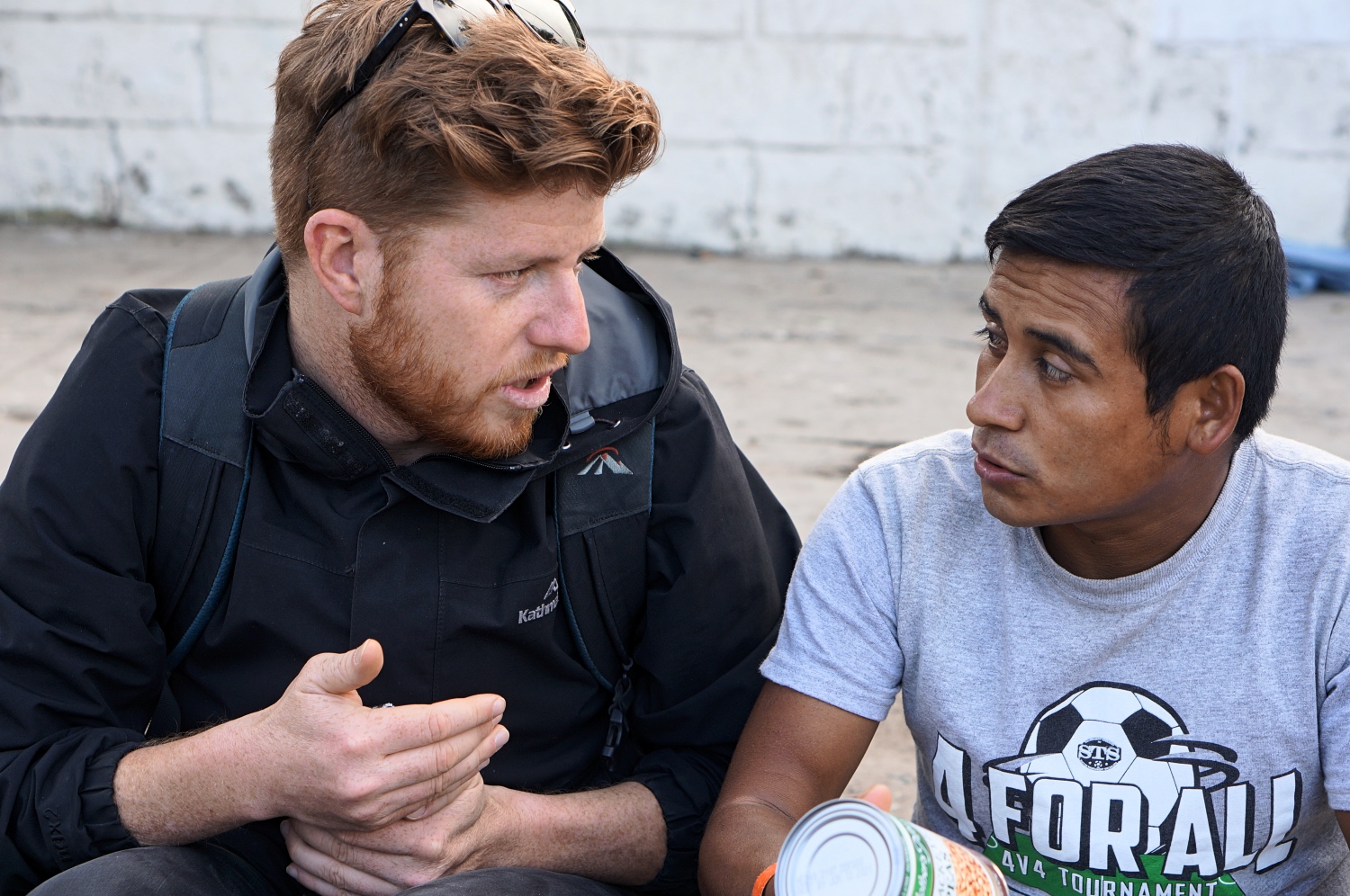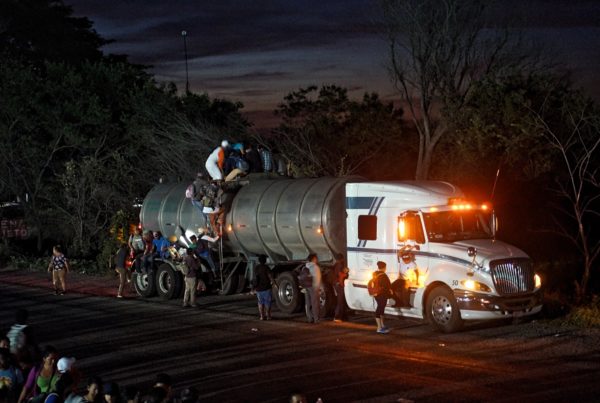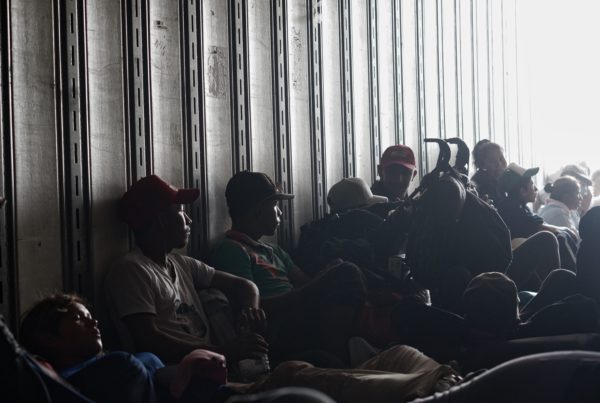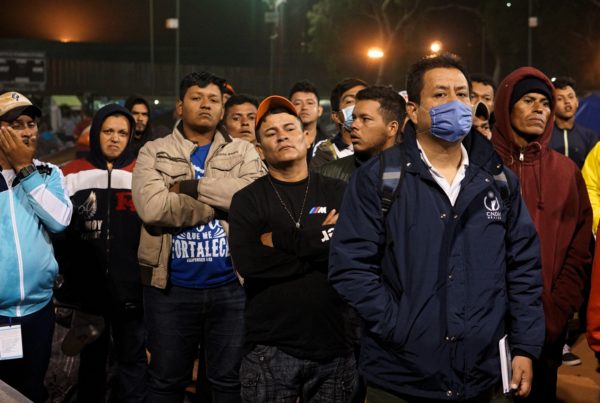I run into Jesus outside the Benito Juarez Sports Arena in Tijuana. I am heading to the border crossing into the US known as Garita El Chaparral. Earlier that day, a large group of people from the Exodus marched to El Chaparral port of entry with the intention of trying to cross. Jesus is returning from that action.
“The Mexican police stopped us and said we couldn’t pass,” he says. “They closed the border.”
The last time I saw Jesus was in Mexico City. He says it took him five days to travel more than 2,700 kilometres from Mexico City to Tijuana. He took buses day and night, without sleeping and without eating food or drinking water. He says basic provisions weren’t offered by the authorities helping the people of the caravan, nor was there any opportunity to buy. Jesus changed from one bus to another, stopping on deserted highways, until he reached Tijuana. Even if there had been opportunity to buy food and water, Jesus did not have any money.
Jesus has been in town for ten days, his future is uncertain, and he’s restless. He does not want to be stuck in Tijuana. He is tired of sleeping on the ground enduring cold, wet evenings and mornings. He feels locked inside the shelter. His money is running low and he says the local authorities haven’t provided food and water for the people inside the shelter.
He experienced violence from the local people of Tijuana when he was staying in a migrant guest house in the region known as Las Playas. He was with a group of people from the caravan when some locals started throwing stones, logs, and bottles. After that Jesus was transported to the shelter in Zona Norte, the red light district of Tijuana.
“They do not want us here,” Jesus says. “We have to cross.”
The people of the caravan have been offered work in Mexico to encourage them not to try and cross into the United States. Jesus met a man who asked him to work at a carwash. He tells me he will work a few days but he doesn’t want to stay in Mexico because he is worried about his wife and 3-year-old daughter back in Honduras.
“They need me to send them money for food. My wife can not stay like this, alone with my daughter.”
Jesus was kicked out of home when he was 5 years old. His dad didn’t believe Jesus was his son. His biological parents didn’t even get him a birth certificate. Luckily he met a man named Roberto who took a liking to him and raised him as his own. Although Jesus never went to school, Roberto taught Jesus how to be a good, honorable person.
“Since I was a kid I’ve always wanted a family, which is why I married young. I guess that has a lot to do with the fact that I never really had a family I could call my own. And now I have a wife and a beautiful daughter whom I love very much.”
It was difficult for him to leave his family but he had 3 major financial responsibilities which he couldn’t afford: rent, utilities and food. His family was constantly going to bed hungry. When he heard about the caravan he made the decision to make the journey to the United States. He was at work when he called his wife to let her know he was leaving. He knew it would be impossible to say goodbye so he didn’t. He simply went to the terminal where the caravan was scheduled to pass by, knowing he may never see his family again. However, that evening his wife and daughter came to the terminal and waited with him. He tried to console them but the closer the caravan got, the more they cried.
“Saying goodbye was one of the hardest things I’ve ever had to do. What a sacrifice it is to achieve the American dream. I want to find work, and call my family on the phone and say: ‘Look. I am very well, and I’m working and I’m sending you money so you can eat.’ That’s my dream. To help them to live a better life. Deep down I am afraid that as my daughter grows up, she will forget who I am and will stop loving me the way she does now. I cannot let that happen.”
Jesus believes in a rumour he heard amongst the people of caravan. If a person has family members in the United States, those family members can pay for the person’s visa and pick them up from the border. He thinks because he has no family in the US he will be deported. He thinks his only option to enter is to jump the wall.
Jesus went to the wall the other night with 12 other people.
“We found a tunnel, a sewer,” he says. “We went through that tunnel until we hit a dead end. The tunnel was sealed with iron bars. We could not pass we had to go back.”
They returned to the Mexican side of the wall and intended to jump, but their attempt was interrupted by a man.
“We looked at the man and he took out a gun. Boom. He tried to kill us. I ran and everyone followed me.”
They ran for about four blocks until a police truck arrived and saved the whole group and returned them to the shelter. Jesus is convinced the man was an operative from a drug cartel.
“I saw death in that second. I felt the bullets. I could feel the slugs in my ribs. But thank God nothing happened to us.”
Jesus doesn’t want to jump the wall to cross into America.
“It’s abusing the authorities of the American lands. But if we do not do it, we will never arrive.”
Jesus is worried that it is only going to get more difficult to cross. In the days since he arrived in Tijuana he has seen the US authorities ramp up security on the wall. There are more migration officers, and more security cameras and hurricane wire installed on the wall. Apart from being killed by drug cartels, he is worried about being detained and deported. He doesn’t know for how long he will be imprisoned if he is caught.
“Imagine that we cross over and are caught by migration. All this sacrifice we have made and nothing will be left for us. It’s a problem that we have to solve peacefully. We have not come to make chaos. But this will only end peacefully when they invite us to say: “Hey brother, we are going to eat on that side”.”
Jesus didn’t try to jump the wall. Instead he returned home to Honduras to be with his family with the help of the International Organisation for Migration.



